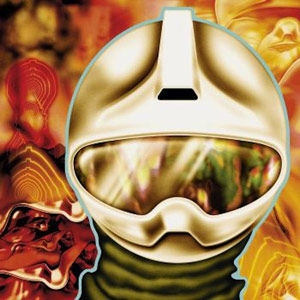
Jared’s Lot
Spectrum Spools
On 2009’s Horribles Parade, Gary War became a singular voice, singling himself out in the post–Blank Dogs wasteland of cold, calculated, bedroom psychedelia and into a stratum where mutant punk was veiled in sci-fi paranoia, prog-infomed expanse, and the most inhuman instance of effects mutilation in recent memory. But that was a long time ago, and though invigorating as Horribles Parade remains, in the internet age, it’s almost ancient history. War’s somewhat sinister anonymity and reclusiveness (at least when it comes to his recorded work) worked enough to keep him in conscious thought, and one could conclude those hours spent away were almost entirely consumed by the next project, created with a mad alchemist intensity.
Surprisingly, Jared’s Lot is a regression, but not in the sense that it dulls the strengths of War’s songs, but in that it takes a complete left-turn into an otherworldly realm of completely alien synth madness and not into the kind of sophistication of, say, when Bowie teamed with Eno for the Berlin trilogy. Then again, the fact that the record is being released on John Elliott’s Spectrum Spools makes perfect sense the first time through. A lot of the obfuscation prevalent in War’s past is present here in the form of wild layers of arpeggiated synths and dizzying delays, crossfades, and distortions—the kind of maximalist transcendence that defines Emeralds and their camp. This is much more than garage rock played with Casios. Though the specter of Gary Newman or Devo, perhaps maybe even a little Brainiac (had they barrelled into the new millennium), looms large in the same way contemporaries like John Maus or the Soft Moon reel in the past, War is a warlock when it comes to juxtaposing that influence against an element so obscure and detached, you’d wonder if the album was composed solely by machines. Vocals rarely make an impact and exist on the fringe, robotically melodic or romantic, but always an afterthought. The visceral guitars that once filled the view are also more or less texture, complementing War’s want for a heavy dose of doomed disco, rather than the standard verse-chorus-verse template.
Still, Jared’s Lot is rife with infectious pop moments that don’t allow the album to stray from the core extraterrestrial atmosphere it possesses. “Care Less” is as propulsive as the Yellow Magic Orchestra’s best moments, but somehow appears digitally altered to be melancholic. Likewise, “World After” could be what a unit of cyborgs hear when they’re blasting Dark Side of the Moon from their lunar post. The song’s wonderful blend of back-masked guitars and acoustic washes makes a grand statement and serves as the record’s penultimate comedown. That core though is wholly dystopian, as if War is more influenced by Phillip K. Dick than he is the records that probably swallow his quarters. War is at his best when he makes ugly, disorienting music. “Advancement in Disgust” is just that—motley and jarring but infinitely fascinating. Meanwhile, “Pleading for Annihilation” toys with a proto-metal underbelly coiled in a distant, hypnotic clairvoyance. After a few listens, Jared’s Lot becomes the soundtrack to some imagined dime novella that will leave you frightened of a future of rubble and engineered overlords, but invigorated knowing we live in that future, and with artists like War at the helm, we’re winning.
Kevin J. Elliott
PRIMITIVE FUTURES
July Singles Round-Up
Dylan Shearer, Porchpuddles
Introducing... Ice Choir
A New Dayton Renaissance
Bring Beer
June Singles Round-Up
King Blood, Vengeance, Man
Introducing... Paula
Mac DeMarco, Rock and Roll Night Club
May Singles Round-Up
Kash, Full Of
Mad Nanna, I Make Blood Better
Introducing... The Blimp
April Singles Round-Up
